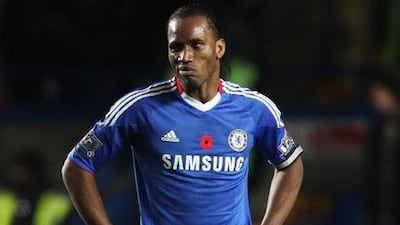Clubs that are run on the whims of their proprietors have an inbuilt unpredictability. They can veer from frugality to extravagance in a blur, turning long-term planning from a scheme to abstract theory.
So it is at Chelsea where a season that was supposedly about shepherding the next generation through then became notable for the attempt to dispose of large sums of money in the dying days of the transfer window.
If the sound of a blueprint being ripped up can be heard in the background, there is a logic, albeit one that has only been belatedly recognised at Stamford Bridge. David Luiz, the Benfica defender Chelsea have recently signed, is 23; Fernando Torres is 26.
As Carlo Ancelotti's strongest side includes six thirty-somethings and his bench can often be an assembly of the untried, there is an obvious need for players nearer the peak of their careers.
The bid for Torres is revealing at many levels. It indicates the desperation felt in Chelsea's bleak midwinter; the prospect of failing to qualify for the Champions League is a factor in the volte face, prompting Roman Abramovich to ignore Uefa's forthcoming financial fair play rules.
It also shows that, finally, an attempt is being made to construct an alternative spine to the side. Since Jose Mourinho united Petr Cech, John Terry, Frank Lampard and Didier Drogba in 2004, the core of the team has remained essentially undisturbed.
The move for Torres, however, is a guillotining. At the head of that spine is Drogba, and it is hard not to interpret the quest for the Spaniard as a threat to the Ivorian. He turns 33 in March and while comparatively late developers sometimes play to an older age and his aerial ability will remain a constant, the clock is ticking.
Can they play together? While a big man-quick man partnership is a staple of English football, that both ignores the individuals involved and the team.
Chelsea have been at their most successful playing 4-3-3, a formation that benefits Lampard especially. Moreover, both Drogba and Torres appear at their happiest as a lone striker.
It suits their mentality. Whether with force or finesse, these are men happy to stage a one-man demolition job on defences.
While the sight of both in harness might induce feelings of fear in opponents, they are not natural partners.
It is undeniable that Drogba's impact has diminished this season - he has four goals in his last 16 games - but it is more debatable whether malaria or the ageing process is responsible.
Anelka's mid-season slump has to be attributed to himself. He has been at his most prolific for Chelsea when Drogba has been sidelined, allowing the Frenchman to spearhead the attack.
The hunt for Torres indicates that the club are reluctant to grant him star billing. His lot is likely to remain on the right wing.
Yet too often this season, the mercurial 31-year-old has displayed his less edifying characteristics: a tendency towards anonymity, an inability to rouse teammates and mediocrity when it mattered most.
The charge laid against the Chelsea strikers is that they have become too complacent.
Salomon Kalou is in his fifth season at Stamford Bridge without shaking off the impression he is a perennial substitute.
Daniel Sturridge rarely convinces Ancelotti that he merits a start in a meaningful match.
What Torres offers, of course, is more than mere competition for places. His speed on the counter-attack is particularly significant given Chelsea's record of one away win in three months.
Tonight they go to Sunderland, whose excellent home record contrasts with Chelsea's troubles. Last week's 4-0 victory over Bolton Wanderers served as reassurance that a top-four finish is probable but for the strikers at Stamford Bridge, it may still feel like the end of an era.
>>>
One of the least edifying sights of the FA Cup weekend was of Cesc Fabregas brandishing an imaginary card in a bid to get Huddersfield's Jamie McCombe sent off.
As the defender's challenge on Nicklas Bendtner produced the penalty that Fabregas converted to send Arsenal into the last 16, referee Mark Clattenburg's decision to book McCombe had no repercussions for the League One side. But the punishment should have been the same for Fabregas; he is a wonderful player, but if that is not ungentlemanly conduct, what is?
>>>
As examples of startlingly bad defending go, it is hard to top Tottenham Hotspur's self-destructive display against Fulham.
The often excellent Michael Dawson's 13-minute cameo included a poor pass that, indirectly, led to Fulham's first penalty and a tug back on Moussa Dembele that brought the second spot kick and his own dismissal.
The consequence is that Spurs, already short of centre-backs, go to Blackburn Rovers tomorrow without the banned Dawson.
Factor in Sebastien Bassong's inability to mark Brede Hangeland for the third goal and Benoit Assou-Ekotto's lame attempts to play offside and it was a display of incredible incompetence.


